#Responsible dissemination of knowledge
Explore tagged Tumblr posts
Text
another thing that is simply amazing about wei wuxian is that he doesn’t give a fuck about hoarding the knowledge he attains. in the cultivation world where clans jealously hold their resources close and have techniques unique to their families because progress is meant for them and theirs–wei wuxian utterly breaks the mould with his inventions. the products of his genius are spread far and wide and his way of doing things is disseminated within the cultivation society as crucial pieces of information. the spirit attraction flag and the compass are used not only by the clans but also the rogues–the bottom most people in their hierarchy. all of them benefit from wei wuxian’s knowlege in a way that the clans are simply incapable of replicating because they would never allow their own methods to leave the boundaries of their clans. and when wei wuxian is back, he takes to teaching instantly and has no qualms against sharing both his experiences and hard-earned wisdom with the juniors and i think it’s important to note that he has literally no affiliation to them prior to meeting them, except jin ling. he doesn’t know sizhui is a-yuan, he just knows they’re lans and later the boys he leads at yi city belong to several different clans–clans that were responsible for his own death and the death of the wen remnants, mind you. but wei wuxian would never make the children bear the sins of their forefathers, of course, just that painting the background helps in understanding how open and willing wei wuxian is about sharing his knowledge with others. it’s very lovely, really. the cultivation society only took from wei wuxian but he only ever gave them back.
#it’s worthwhile to mention that the reason i don’t consider the gusulan guest lectures in the same vein is coz the info taught is general#not really smth additional or unique that would help the progress of students in other clans through means that they themselves developed#wei wuxian appreciation#wei wuxian#mdzs meta#mdzs#jianghu
1K notes
·
View notes
Text
Random Astrology Observation

The fact that Mars is in the first house suggests that confidence, physique, and self-image are highly valued. These people appear to focus their energy on keeping up a powerful, alluring persona. Being eager to give people more self-assurance points to a helpful and inspiring personality.
Mars's position in the ninth house presents an exciting and daring image. The love of adventure, philosophy, and travel fits very well with this placement's expansive character. Extreme sports fervor is indicative of a will to push limits and experience life to the fullest. A desire to disseminate knowledge and a broader viewpoint are reflected in the goal of education and teaching. Adhering to specific values gives their approach more depth and makes the journey lively and meaningful.
Sagittarius Mars traits indicate a great dislike for anything that restricts their freedom or stifles their independence. They don't like to wait around and value efficiency, thus being on time is crucial to them. They cherish their autonomy, therefore any attempts to limit or control them may encounter opposition. People in this role may also become frustrated by unreasonable responsibilities and rigidity.
The variety of characteristics that people with Leo moons exhibit, from a difficult connection with trust to creativity, forgiveness, and a craving for attention and giving. The knowledge of their inclinations, driving forces, and educational experiences deepens the comprehension of this lunar positioning.
Even though it can occasionally come out as judgmental, Virgo Sun people's honesty is valued for its directness. Their readiness to be open about their true emotions and to offer candid counsel is indicative of their dedication to truth and authenticity.
People with Jupiter conjunct Moon are described as having a strong and alluring emotional presence. They seem to have a significant influence on people around them if they can control emotions and use their auras to create a spell. Through their artistic or intellectual endeavors, individuals appear to have secret knowledge banks that open up when they communicate their feelings. The secret to revealing the depth and richness within is found in the allure of their bursting emotions.
In fact, the 10th house in astrology is frequently linked to one's profession and public life. It stands for a person's reputation, accomplishments, and career goals. The planets and signs that make up the 10th house, along with any aspects that they may form, can provide information about a person's attitude toward their work, public persona, and desired global influence.
The depiction of Pisces Mercury in a relationship creates a lovely image of profound understanding of their partner and nearly psychic communication since they have sensitive energy to sense whether something is off. When words are utilized they will use it to bring out the most understanding and sensitive parts of their partner, they love a connection that appears to be a source of consolation and healing. They want their friendship or relationship to take on a lyrical and inspiring dimension due to their appreciation of arts especially music and they have the possibility of writing or even dedicating songs for their loved ones.
Mars in the seventh house frequently denotes a forceful and proactive approach to interpersonal connections. People that have this placement tend to be direct, aggressive, and passionate in their relationships. They can be looking for a companion who can have lively conversations and is just as vivacious. They might have a strong desire to take the lead in relationships and relish the excitement of working together on projects. Direct communication and a desire to resolve conflicts amicably are two possible components of conflict resolution.
Venus in the Ascendant, sometimes referred to as Venus in the First House, frequently improves a person's attractiveness, charm, and relationship style. People that are placed in this position typically have a friendly and cheerful disposition. They could be naturally magnetic, capturing the attention of others with their charisma or beauty. Their identity is greatly shaped by their relationships, and they may place a high importance on harmony and aesthetics in their self-expression. A great desire to establish and preserve lovely relationships in the social and personal domains may be present.
924 notes
·
View notes
Text
the mr beast pyramids thing is fucked up for several reasons but here are some of the ones that i personally have been thinking about
1. historical significance and capitalism (aka "why does this white man get special privileges? why is he allowed to rent out a world wonder and why do we live in a world where that's possible") - it's not that renting out the pyramids is unheard of because it's definitely happened before. @jehadism even mentioned that the location was rented out for a rave recently. but why do we live in a world where it's possible to reserve access to historical monuments for the rich white foreigners? and how is it that one (1) man has enough money to do this?
2. contemporary cultural significance and the egyptian government (aka "my egyptian mutuals hate this and i've been friends with them long enough to at least have an introductory understanding as to why") - how much access does the average egyptian have to their own history? what with white foreigners looting graves and the egyptian dictatorship destroying monuments, how much easier is it for a white american like myself to go to a museum in person and see the results of white colonialism in "ancient egypt" exhibits as if egyptians aren't a real, still-living community of people? and how much harder is it for an egyptian under dictatorship to visit historical monuments in their own city? what hoops does the average egyptian need to go through just to view artifacts that should be preserved by egyptians, for egyptians, in egypt? why is it that mr beast doesn't have to go through these hoops and can make a public youtube video about it and yet egyptians get disappeared by their own government if they try to speak up against that very government desecrating historical sites?
3. information dissemination and the indoctrination of white supremacist youth (aka "what does this mean for future attitudes towards egyptians and egyptian culture") - mr beast's fanbase is predominantly children which is something mr beast himself has full knowledge of and has stated as such. especially with the more recent allegations against him and his various business pursuits, any adults who happen to watch him already don't care about the moral truth of his actions. the children that watch his channel are the target audience here. he has an ethical responsibility to carefully consider what he shows to the public. he has a moral obligation to show these children how to be a good person and to educate them. or at the very least he has a duty to not model 'how to be human scum' for the kids on the other side of the screen. and yet, here he is, promoting an orientalist view of egypt. planting little seeds in their minds that (white) egyptology is cool and mysterious and fantastical. not to mention he has no historical or archaeological certification. he's showing these kids that it's okay for the most average of white americans (albeit very very rich but other than that still extremely average) to waltz into an egyptian burial ground and play make believe about solving mysteries and getting trapped in mazes and chased by the living dead despite having zero certification. even when the white people invading egyptian historical sites are literally trained historians and archeologists, they still exemplify white supremacist, orientalist notions about egypt. the problem isn't that mr beast's opinions about egypt will inevitably suck (well. it's a problem but given that he's a rich white man and literally mr beast, i'm treating that as a given and it's not what i'm gonna focus my thoughts on) no the problem here is that he's teaching children that it's okay to have said opinions. he's teaching white children to mistreat the nonwhite children around them and to grow up and continue to oppress egyptians in the exact way they saw their childhood idol do. he's teaching any egyptian children who watch him that white people will always devalue their history and their culture
#swingset#all of this has been said by egyptians already#all of this has been said by my egyptian mutuals even#i'm not really writing this for other people so much as gathering my own thoughts#talk to mina and jehad and bapbas#not me i'm just some white american#really it's the last part that i find the most disturbing#the continuous cycle of indoctrination#i mean on a logical level ofc the other stuff is bad too but i only really start to actually feel things about it when i think abt that part#<- doesn't feel strong emotions easily and also has a history with child endangerment via indoctrination and mental conditioning
235 notes
·
View notes
Text
Oh, also, I really hope that this point isn't news to anyone, but if you don't already have a basic understanding of what it means to develop information security, now is the fucking time.
Critically, I want to see people being responsible in how they interact with:
A) the dissemination of information and the correction or disruption of misinformation
B) privacy related or personal data (of themselves, but ESPECIALLY of others who you could unknowingly harm)
C) pictures and visual media
D) your bodies: not a good time to start leaving traces of yourself where they shouldn't be, e.g. blood, saliva, etc
E) triangulatory/tangential information (you know that guy who can tell where you are by the weather descriptions? That's an extreme example very few people can pull off, but you'd be horrified how little info I need about someone to correctly interpret whole sections of their personal history and data)
F) other people. If you have never formally done so, find a conflict resolution/group facilitation class with a local organizing group or community college. Start learning what healthy boundaries (flexible, but neither porous nor rigid) look like for you. Pick a communication style to cultivate so you can be consistent in how you navigate stressful moments. Figure out what it means to you to share space with others with intention. (And yes, there is no one way to do this, but every one of us will need to find our most secure version, whatever that is, ESPECIALLY those of us who are already vulnerable here due to past trauma, neurotype, TBI, healthcare/wellbeing needs, etc)
I'm a really open book in a lot of ways, and yall might rightly look at that and go "butts you're one to talk about infosec"
And yeah. Yeah. But like.
I know what you know. I made those choices on purpose or at the very least addressed the aftermath of the accidents with intention. I also know what I did to be protective of myself and my info, and you don't know those things. You should know how to do them for yourself though, because it will help you understand why I can have done what I've done over the years and still say this now.
It matters what people know. It matters how easy that knowledge is to revisit. It matters how much of that knowledge is heresay vs documented and verifiable. It matters what contrary information is ALSO known. It matters what interconnected information about OTHER PEOPLE is known. It matters when you haven't said anything at all versus when you said a bit versus when you said a LOT. It matters when you say a lot without saying anything at all.
Information gathering is about putting together puzzle pieces. It's slow work, and it involves a massive amount of resources to do comprehensively and at scale. Information security is about making the gathering process not worth the investment such that the gatherers give up before they are able to put together enough pieces to do real damage. This is what "need to know" means.
For example, in a healthcare practice, it is a HIPAA requirement that access to protected patient info be limited to those who have a clinically relevant reason for accessing it. This means that certain system credentials or permissions will reveal varying amounts of protected information about a person. While one MIGHT be able to put together enough puzzle pieces for certain minor information gathering from early stages (e.g. where someone will be a the specific time of their appt), one likely cannot identify deeper and more vulnerable levels of information (who is the appt with and what is it for?)
This kind of layered buffer is most important when people who AREN'T PERMITTED (permited as in able to do without effective correction/consequence, not permitted as in legally or appropriately authorized to do) to access this info are trying to access it. If someone is permitted (e.g. if person with the appropriate credentials/access permission discloses it voluntarily or if a subpoena is ordered, etc) then the level of access is less protective - they will typically simply access the level of info they need if they will be permitted to.
But there are further layers still of information security. For example, you can tie up a LOT of time forcing authorized bodies to refresh and specify their authorization over and over again, each time appropriately only providing the exact level of disclosure they have required of you. The more specific the information they are looking for, the easier it is to bury so deep down that they literally cannot access it even if they are looking right at it.
I was taught to write documentation "like at any time it could be read out by the patient in front of you, or by another provider asking us to justify a treatment, or in open court by order of a judge". For a year, my supervisor had me write four copies of every piece of documentation I ever made. My personal copy (burned upon completion of the billable note), my "soft note" that removed all protected/identifiable information from the narrative (e.g. names, ages, genders, specific diagnoses/conditions), my "hardnote" which removed anything "heresay" which had been self-reported by the patient unless I could professionally verify it), and lastly my billable note which I understood needed to offer "detailed justificstion" for the used (and named) interventions which cannot be used to work backwards and interpret the originating care conversation.
The only note that ever gets read by anyone but myself is the billable, because they others are never retained long enough to be seen by others, even if they do have the appropriate access. It becomes very difficult for someone to use the hard data they are capable of getting from me, voluntarily or by force, to actually confirm context. This is a similar principle when orhanizers compartmentalize need-to-information.
So start learning what it looks like to cordon off each layer of infosec you're about to implement in your life. What it will look like to grant someone access to a new layer.
Be responsible. We protect us.
#man i really hope i actually managed to make clear what i'm trying to say here#dogwhistles are hard when your workbook comes from three generations back lol
50 notes
·
View notes
Text
Different Types of Propaganda: Part 1
Hello chuckle fucks of Tumblr, it's clear to me that you no fucking clue what propaganda is or how to spot it.
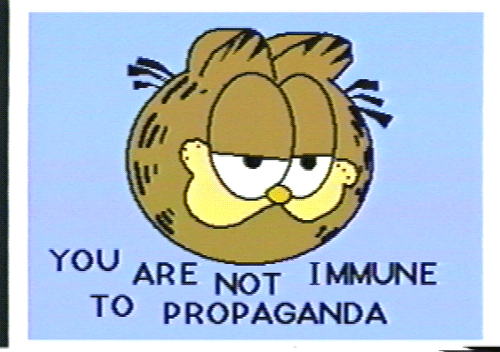
So 1st is what is propaganda?
Definition of propaganda:
the spreading of ideas, information, or rumors to help or injure an institution, a cause, or a person ideas, facts, or allegations spread deliberately to further one cause or to damage an opposing cause https://www.merriam-webster.com/dictionary/propaganda
dissemination of information—facts, arguments, rumors, half-truths, or lies—to influence public opinion. It is often conveyed through mass media. https://www.britannica.com/topic/propaganda
information, ideas, opinions, or images, often only giving one part of an argument, that are broadcast, published, or in some other way spread to influence people's opinions https://dictionary.cambridge.org/us/dictionary/english/propaganda
Propaganda Techniques Explained
This video does a good job of summarizing the different techniques
https://www.youtube.com/watch?v=sybo484veJY (you have to copy the link because the video doesn't allow playback.)
Agenda Setting:
Agenda: a secret aim or reason for doing something. (https://dictionary.cambridge.org/us/dictionary/english/agenda?q=Agenda)
A situation where critics perceive inexplicit political motives (or an institutional tendency to overlook underprivileged perspectives) to lie behind the choice of topics covered (e.g. in the news, current affairs, and documentaries), their relative importance (inferred from sequence and the relative amounts of space or time devoted to them), how they are presented, and what issues are backgrounded or excluded (see also selective representation). Media agendas are often set by ‘authoritative sources’ in government and industry upon which news organizations rely. The primary concern is that those in power thus call attention to issues that suit their agendas and distract attention from those that undermine them. It is usually argued that this influences or determines the terms and scope of public debate—not by telling people what to think but by telling them what to think about and controlling the salience for them of particular issues. (https://www.oxfordreference.com/display/10.1093/oi/authority.20110803095355782)
Agenda setting means the "ability [of the news media] to influence the importance placed on the topics of the public agenda". If a news item is covered frequently and prominently, the audience will regard the issue as more important. (https://en.wikipedia.org/wiki/Propaganda_techniques#:~:text=Bandwagon%20and%20%22inevitable%2Dvictory%22,the%20road%20to%20certain%20victory)
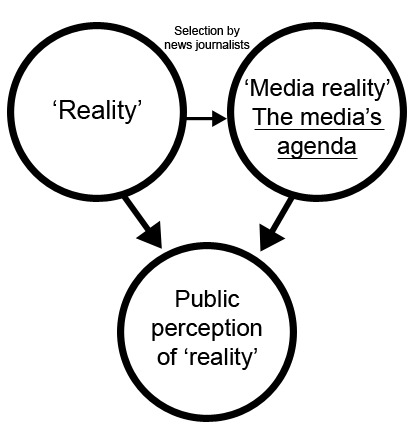
(https://www.researchgate.net/figure/Agenda-Setting-Theory-Model_fig1_307536314)
Fear Appeal:
A psychological and rhetorical strategy in persuasive communication such as advertising that seeks to evoke a response of fear or anxiety in the audience by showing them an undesirable outcome that they can avoid by heeding the warning. This strategy is intended to increase the effectiveness of the message and it is commonly used in health and safety campaigns, such as those warning motorists not to drink and drive. (https://www.oxfordreference.com/display/10.1093/oi/authority.20110803095812722?p=emailAWHA3YEy2eMug&d=/10.1093/oi/authority.20110803095812722)
For example, fear can be used to drive votes toward a particular candidate or party—a method that relies on our natural instinct to find safety in numbers. And, a meta-analysis conducted by Albarracin and her colleagues found that messages with fear are nearly twice as effective as messages without fear (Psychological Bulletin, Vol. 141, No. 6, 2015). (https://www.apa.org/news/apa/2020/fear-motivator-elections)

(https://thevisualcommunicationguy.com/2017/09/14/the-fear-appeal-advertising/)

(https://en.wikipedia.org/wiki/Irreversible_Damage)
Appeal to Prejudice
Prejudice: an unfair and unreasonable opinion or feeling, especially when formed without enough thought or knowledge. (https://dictionary.cambridge.org/us/dictionary/english/prejudice)
The one who makes the appeal to prejudice attempts to persuade you to act or feel in a certain way by associating his person, product or proposal with a certain one or more of your prejudices, positive or negative – a prejudice being a prejudgment wrapped in emotion and having a history. Not only does he rekindle your prejudice, he also arouses in you warm feelings toward the one (himself) who apparently shares your prejudice. And so it becomes much easier to make you believe or buy whatever he has to offer. (https://agloa.org/wp-content/uploads/2019PropGuidelinesSecD.pdf)
Using loaded or emotive terms to attach value or moral goodness to believing the proposition. (https://en.wikipedia.org/wiki/Propaganda_techniques#:~:text=Bandwagon%20and%20%22inevitable%2Dvictory%22,the%20road%20to%20certain%20victory)

Der ewige Jude, a pseudo-documentary directed by Fritz Hippler and influenced by German Minister of Propaganda Joseph Goebbels, featured scenes of Jews in Warsaw and Lodz ghettos. The film was popular in Germany and occupied Europe, with notorious sequences comparing Jews to rats carrying contagion. The film also highlighted the alien nature of East European Jews, with "stereotypical" Polish Jews transformed into "western-looking" Jews. The film's crude characterizations and gruesome footage made it a hit with audiences, demonstrating that there was no difference between Jews in East European ghettos and those in German neighborhoods.( https://encyclopedia.ushmm.org/content/en/article/der-ewige-jude)
Inevitable Victory + Bandwagon
Inevitable: certain to happen and unable to be avoided or prevented (https://dictionary.cambridge.org/us/dictionary/english/inevitable?q=Inevitable) + Victory: an occasion when you win a game, competition, election, war, etc. or the fact that you have won. (https://dictionary.cambridge.org/us/dictionary/english/victory?q=Victory) = Certain to happen and cannot to be stopped or averted occasion when you win a game, competition, election, war, etc.
Bandwagon: an activity, group, movement, etc. that has become successful or fashionable and so attracts many new people. (https://dictionary.cambridge.org/us/dictionary/english/bandwagon)
An effort is made to influence you to act in a certain way by asserting or implying that that is what is popular or what the majority is doing (https://agloa.org/wp-content/uploads/2019PropGuidelinesSecD.pdf)
invites those not already on the bandwagon to join those already on the road to certain victory. Those already or at least partially on the bandwagon are reassured that staying aboard is their best course of action. (https://en.wikipedia.org/wiki/Propaganda_techniques#:~:text=Bandwagon%20and%20%22inevitable%2Dvictory%22,the%20road%20to%20certain%20victory)

(https://www.newyorker.com/news/john-cassidy/the-big-question-about-donald-trumps-rise-in-the-polls)

(https://x.com/AHA_tylersgap/status/734961473265373185/photo/1)
Beautiful People
The type of propaganda that deals with famous people or depicts attractive, happy people. This suggests if people buy a product or follow a certain ideology, they too will be happy or successful. (This is used more in advertising for products, instead of political reasons.) Usually for advertising rather than political purposes, sexual arousal may also be used. (https://en.wikipedia.org/wiki/Propaganda_techniques#:~:text=Bandwagon%20and%20%22inevitable%2Dvictory%22,the%20road%20to%20certain%20victory)
depiction of attractive famous people or happy people to associate success or happiness with adherence to an idea or cause or purchase of a product. (https://www.dailywritingtips.com/50-types-of-propaganda/)

(https://quizlet.com/855901690/persuasive-techniques-flash-cards/)
Big lie
The repeated articulation of a complex of events that justify subsequent action. The descriptions of these events have elements of truth, and the "big lie" generalizations merge and eventually supplant the public's accurate perception of the underlying events. (https://en.wikipedia.org/wiki/Propaganda_techniques#:~:text=Bandwagon%20and%20%22inevitable%2Dvictory%22,the%20road%20to%20certain%20victory)
A big lie (German: große Lüge) is a gross distortion or misrepresentation of the truth primarily used as a political propaganda technique. The German expression was first used by Adolf Hitler in his book Mein Kampf (1925) to describe how people could be induced to believe so colossal a lie because they would not believe that someone "could have the impudence to distort the truth so infamously". Hitler claimed that the technique had been used by Jews to blame Germany's loss in World War I on German general Erich Ludendorff, who was a prominent nationalist political leader in the Weimar Republic. (https://en.wikipedia.org/wiki/Big_lie)
A deliberate gross distortion of the truth is used especially as a propaganda tactic. (https://www.merriam-webster.com/dictionary/big%20lie)

(https://thenevadaindependent.com/article/big-lie-looms-over-nevadas-legislative-primaries)

(https://en.wikipedia.org/wiki/Political_views_of_Adolf_Hitler#Mein_Kampf)
Black-and-white fallacy
Presenting only two choices, with the product or idea being propagated as the better choice. (https://en.wikipedia.org/wiki/Propaganda_techniques#Specific_techniques)
type of cognitive distortion characterized by the tendency to see things in absolutes, with no shades of grey in between. This type of thinking can manifest in various aspects of life, from relationships to work to personal beliefs. (https://www.psychowellnesscenter.com/Blog/how-does-black-and-white-thinking-affects-your-mood-and-behavior)
only two choices are given. You are either for something or against it; there is no middle ground or shades of gray. It is used to polarize issues and negate all attempts to find a common ground. (https://www.cuesta.edu/student/resources/ssc/study_guides/critical_thinking/103_think_logic_errors.html#:~:text=This%20technique%20is%20also%20called,to%20find%20a%20common%20ground)


"“Globalize the Intifada” is a phrase used by pro-Palestinian activists that calls for aggressive resistance against Israel and those who support Israel. The most prominent expressions of intifada have been through violence so this phrase is often understood by those saying and hearing it as encouraging violence against Israelis, Jews, and institutions supporting Israel. While the intent of the person saying this phrase may be different, the impact on the Jewish community remains the same."
(https://www.ajc.org/news/what-does-globalize-the-intifada-mean-and-how-can-it-lead-to-targeting-jews-with-violence)

See when people say "Globalize the Intifada" it implies that there are only two choices in the conflict. One, is the pro-Palestine side, that the aggressive resistance against Israel, and those who support it, and the pro-Israel side is the ones they are against. Without realizing that there is a peaceful option. ( The one I do not know because, one I am not a politician, and international politics is a mess. And two I do not know enough about the conflict to support a peaceful end where everyone is satisfied. )
Cherry picking
suppressing evidence, or the fallacy of incomplete evidence is the act of pointing to individual cases or data that seem to confirm a particular position while ignoring a significant portion of related and similar cases or data that may contradict that position. Cherry-picking may be committed intentionally or unintentionally. (https://en.wikipedia.org/wiki/Cherry_picking)
Present only evidence confirming your position, while ignoring or withholding an often more significant portion that contradicts it. (https://www.propwatch.org/category_results.php?cat_id=1&id=29&k=cherry+picking&p=propaganda.php)
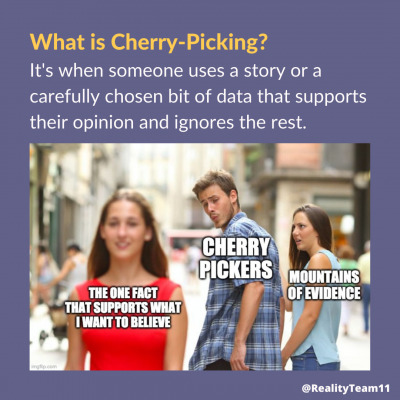
Example : “CLAIM: Four recent shootings show there has been an “incredible rise” in transgender or nonbinary mass shooters in the past few years, making the group “by far the largest group committing as a percentage of the population.” Donald Trump Jr. spread the narrative widely on Twitter, claiming the supposed “incredible rise” and later saying there was a clear trend forming. Hundreds of other social media users amplified the idea. Trump Jr. did not respond to a request for comment.” THE FACTS: While specific data on transgender and nonbinary mass shooters can be hard to isolate, available information shows that the overwhelming majority of assailants in mass shootings are cisgender males. In making the claim, social media users are citing four examples over the past five years in which the assailant in a shooting identified as trans or nonbinary: the November killing of five at a gay nightclub in Colorado Springs, Colorado; a 2019 shooting at a Denver-area school by two shooters, one of them a trans man, that left one student dead and eight wounded; a 2018 shooting at a Maryland warehouse that left four dead, including the shooter; and the shooting Monday in Nashville. The number of mass shootings committed by those identifying as trans or nonbinary — and their ratio compared to mass shootings committed by other groups — is hard to quantify. It depends on the database used, how the act is defined, and how gender identity is recorded — for example, transgender males may statistically be counted as just men. But experts agree that the most reputable information still shows a clear pattern that cisgender males are the most likely to commit such an act of mass violence.” (https://apnews.com/article/fact-check-transgender-nashville-shooting-misinformation-cd62492d066d41e820c138256570978c)
youtube
(02:15: cherry picking definition: Biden highlights only wage growth in "the bottom 40%," while not mentioning that, due to inflation, real wages actually declined for all other income groups.) (https://www.propwatch.org/category_results.php?cat_id=1&id=29&k=cherry+picking&p=propaganda.php)
Classical conditioning
That is, if A is always present when B is present and B causes a physical reaction (e.g. disgust, pleasure), then when presented with object A in the absence of B, that same reaction will be experienced. (https://en.wikipedia.org/wiki/Propaganda_techniques#Specific_techniques)
The behavioral psychological method that systematically transfers feelings, thoughts, or dispositions through relationships. It pairs an object, event, or variable that elicits a particular natural or reflexive response (unconditioned stimulus) with a neutral one to the point that only the presence of the latter is required to induce the originally impulsive and event-specific response. This time, it’s no longer neutral but a conditioned stimulus. (https://www.thecable.ng/classical-conditioning-potent-political-strategy/)
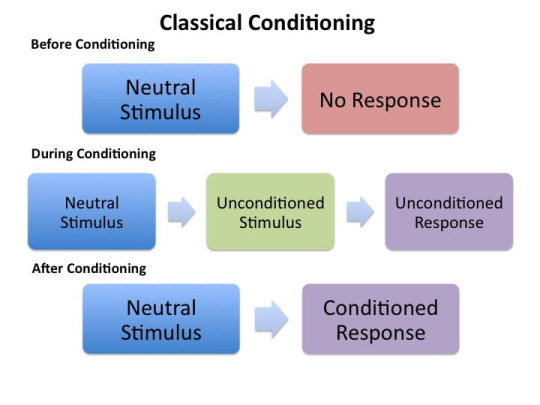
(https://sites.psu.edu/intropsychf19grp7/2019/11/15/classical-conditioning-puppy-training/)
youtube
youtube
As you can see, the food products in both these ads have been depicted as mouth-watering and delicious, and are designed to cause consumers to feel hungry. (https://www.advergize.com/marketing/classical-conditioning-examples-in-psychology/#Classical_Conditioning_in_Advertising_Examples)
Ad hominem
A Latin phrase that has come to mean attacking one's opponent, as opposed to attacking their arguments. (https://en.wikipedia.org/wiki/Propaganda_techniques#Specific_techniques)
attacking the character or motive of the person making an argument, rather than attacking the argument itself. (https://www.propwatch.org/term_results.php?cat_id=1&id=23&k=ad+hominem)
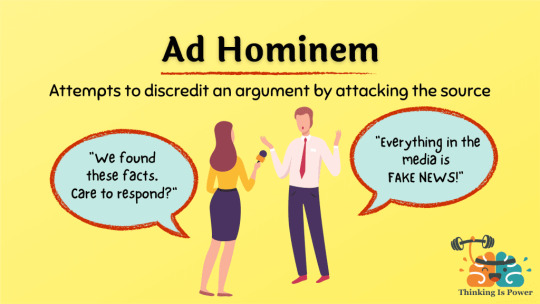
(https://thinkingispower.com/logical-fallacies/)
youtube
(35:19: ad hominem definition: Warnock attacks the character of Walker and his allies for making allegations against his church, without addressing any of the specific allegations against his church.) (https://www.propwatch.org/term_results.php?cat_id=1&id=23&k=ad+hominem)
Ad nauseam
This uses tireless repetition of an idea. An idea, especially a simple slogan, that is repeated enough times, may begin to be taken as the truth. (https://en.wikipedia.org/wiki/Propaganda_techniques#Specific_techniques)
repeating something over and over again, until it forms a mental association and/or becomes perceived as truth. Based on the "mere exposure effect," is a psychological phenomenon by which people tend to develop a preference for things merely because they're familiar to them, including things they don't like. This principle for example makes people more likely to prefer listening to a song they've heard before over a new song they've never heard and to believe something they hear repeatedly, even if they know it's untrue.(https://www.propwatch.org/category_results.php?cat_id=1&id=24&k=ad+nauseum&p=propaganda.php)

"Make America Great Again"
(https://www.msnbc.com/msnbc/donald-trump-dropped-378000-make-america-great-again-hats-2015s-final-quarter-msna786506)
Appeal to authority
Appeals to authority cite prominent figures to support a position, idea, argument, or course of action. (https://en.wikipedia.org/wiki/Propaganda_techniques#Specific_techniques)
(also known as an appeal to false or unqualified authority) plays on people’s feelings of respect or familiarity towards a famous person to bypass critical thinking. It’s like someone is telling us “accept this because some authority said it.” (https://www.scribbr.com/fallacies/appeal-to-authority-fallacy/#:~:text=An%20appeal%20to%20authority%20)
appeal to anonymous authority - insisting something is true because an unnamed expert, study, or generalized group (like 'scientists') says it's true (https://www.propwatch.org/category_results.php?cat_id=1&id=73&k=appeal+to+anonymous+authority&p=propaganda.php)

youtube
(09:56: appeal to anonymous authority see definition: There are "those that say" you can test too much, without identifying who those people are.) (https://www.propwatch.org/category_results.php?cat_id=1&id=73&k=appeal+to+anonymous+authority&p=propaganda.php)
Cognitive dissonance
People desire to be consistent. Suppose a pollster finds that a certain group of people hates his candidate for senator but loves actor A. They use actor A's endorsement of their candidate to change people's minds because people cannot tolerate inconsistency. They are forced to either dislike the actor or like the candidate. (https://en.wikipedia.org/wiki/Propaganda_techniques#Specific_techniques)
Creates a feeling of mental stress when we encounter ideas or beliefs that conflict with our own. (https://www.propwatch.org/term_results.php?id=99&k=cognitive%20dissonance)
Psychological conflict resulting from incongruous beliefs and attitudes held simultaneously. (https://www.merriam-webster.com/dictionary/cognitive%20dissonance)
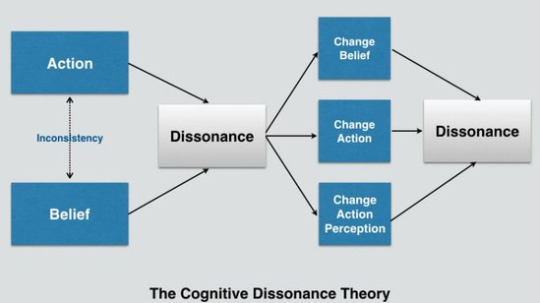
Common man
The approach attempts to convince the audience that the propagandist's positions reflect the common sense of the people. It is designed to win the confidence of the audience by communicating in the common manner and style of the target audience. Propagandists use ordinary language and mannerisms (and clothe their message in face-to-face and audiovisual communications) in attempting to identify their point of view with that of the average person. A common example of this type of propaganda is a political figure, usually running for a placement, in a backyard or shop doing daily routine things. This image appeals to the common person. With the plain folk's device, the propagandist can win the confidence of persons who resent or distrust foreign-sounding, intellectual speech, words, or mannerisms. (https://en.wikipedia.org/wiki/Propaganda_techniques#Specific_techniques)
Establishing a connection with an audience based on being just like one of them and being able to empathize with their concerns. (https://www.propwatch.org/category_results.php?cat_id=1&id=30&k=common+folk&p=propaganda.php)
youtube
(04:53: common folk see definition) (https://www.propwatch.org/category_results.php?cat_id=1&id=30&k=common+folk&p=propaganda.php)

(https://movieposters.ha.com/itm/movie-posters/war/world-war-ii-propaganda-us-government-printing-office-1944-navy-poster-285-x-40-i-m-proud-of-you-folks-too-jo/a/7132-86871.s)
Cult of personality
A cult of personality arises when an individual uses mass media to create an idealized and heroic public image, often through unquestioning flattery and praise. The hero personality then advocates the positions that the propagandist desires to promote. (https://en.wikipedia.org/wiki/Propaganda_techniques#Specific_techniques)
A situation in which a public figure (such as a political leader) is deliberately presented to the people of a country as a great person who should be admired and loved. (https://www.merriam-webster.com/dictionary/cult%20of%20personality)
“Nazi propaganda often focused on glorifying Adolf Hitler as Germany’s sole savior in order to inspire a sense of personal devotion to him. Many films, books, newspapers, magazines, and other items portrayed Hitler as a strong and self-sacrificing father figure who personally embodied the character traits of the “ideal Nazi.”” (https://perspectives.ushmm.org/tag/cult-of-personality)

(Recently appointed as German chancellor, Adolf Hitler greets President Paul von Hindenburg in Potsdam, Germany, on March 21, 1933. This pose was designed to project an image of Hitler as non-threatening to the established order. This particular image is from a popular postcard. The photo also appeared widely in both the German and international press. Hitler appears in civilian dress, bowing in deference to the heavily decorated von Hindenburg. The March 5, 1933, elections had conferred legitimacy on Hitler's leadership.) (https://encyclopedia.ushmm.org/content/en/article/making-a-leader)

(https://foreignpolicy.com/2020/09/30/washington-trump-and-cults-of-personality/)
Demonizing the enemy
Making individuals from the opposing nation, from a different ethnic group, or those who support the opposing viewpoint appear to be subhuman, worthless, or immoral, through suggestion or false accusations. Dehumanizing is also a term used synonymously with demonizing, the latter usually serves as an aspect of the former. (https://en.wikipedia.org/wiki/Propaganda_techniques#Specific_techniques)
Psychological process whereby opponents view each other as less than human and thus not deserving of moral consideration. Jews in the eyes of Nazis and Tutsis in the eyes of Hutus (in the Rwandan genocide) are but two examples. Protracted conflict strains relationships and makes it difficult for parties to recognize that they are part of a shared human community. Such conditions often lead to feelings of intense hatred and alienation among conflicting parties. The more severe the conflict, the more the psychological distance between groups will widen.
“During the protracted conflict, feelings of anger, fear, and distrust shape the way that the parties perceive each other. Adversarial attitudes and perceptions develop and parties begin to attribute negative traits to their opponent. They may come to view the opponent as an evil enemy, deficient in moral virtue, or as a dangerous, warlike monster. Such images can stem from a desire for group identity and a need to contrast the distinctive attributes and virtues of one's own group with the vices of the "outside" group…Enemy images are usually black and white. The negative actions of one's opponent are thought to reflect their fundamental evil nature, traits, or motives. One's own faults, as well as the values and motivations behind the actions of one's opponent, are usually discounted, denied, or ignored. It becomes difficult to empathize or see where one's opponent is coming from.”
“Once certain groups are stigmatized as evil, morally inferior, and not fully human, the persecution of those groups becomes more psychologically acceptable. Restraints against aggression and violence begin to disappear. Not surprisingly, dehumanization increases the likelihood of violence and may cause a conflict to escalate out of control. Once a violence break over has occurred, it may seem even more acceptable for people to do things that they would have regarded as morally unthinkable before.Parties may come to believe that destruction of the other side is necessary, and pursue an overwhelming victory that will cause one's opponent to simply disappear. This sort of into-the-sea framing can cause lasting damage to relationships between the conflicting parties, making it more difficult to solve their underlying problems and leading to the loss of more innocent lives."(https://www.beyondintractability.org/essay/dehumanization)
“In Virginia, for example, we are witnessing the most anti-LGBT legislative session in the state’s history. So far, 9 anti-gay and anti-trans bills have been introduced. Some of the bills reveal a fixation with determining the “anatomical sex” of students to ensure that trans students are expelled from communal bathrooms. One goes so far as to impose a $50 civil penalty on any student who uses the “wrong” bathroom. Others seek to prevent trans people from updating their Virginia birth records to match their gender and limit nondiscrimination protections based on sex to people whose gender matches the gender assigned to them at birth.” (https://www.aclu.org/news/lgbtq-rights/legislators-across-country-set-their-sights-transgender-people)

(https://www.worldjewishcongress.org/en/news/defining-antisemitism-talking-about-israeli-policy-by-using-classical-antisemitic-tropes)

(https://www.tumblr.com/the-library-alcove/search/zionism)

(https://en.abna24.com/story/1410340)
Demoralization
Propaganda towards an adversary to erode fighting spirit, and encourage surrender or defection. (https://en.wikipedia.org/wiki/Propaganda_techniques#Specific_techniques)
Propaganda in wartime must seek to demoralize enemy morale. A primary objective of propaganda aimed at enemy nations is to break down their will to fight. It seeks to lower the enemy’s will to resist and it does this in several ways. One is to picture the military successes on the propagandist’s side. Another is to picture the armed might and economic power that the enemy has to face. Yet another is to picture the moral superiority of the cause against which the enemy is fighting. It is part of a nation’s strategic plan to intimidate enemy leaders, to separate them from their people, and to break down resistance by producing evidence that the mass of the enemy people have been deceived and misled. (https://www.historians.org/about-aha-and-membership/aha-history-and-archives/gi-roundtable-series/pamphlets/em-2-what-is-propaganda-(1944)/war-propaganda)

(https://x.com/Cluffalo/status/1790011284471083192)
#you are not immune to propaganda#propaganda#Agenda Setting#Fear Appeal#Anti trans propaganda#anti trans#Appeal to Prejudice#jumblr#antisemitism#bandwagon#Inevitable Victory#trump#donald trump#tw trump#holocaust memorial trust#beautiful people#big lie#mein kampf#Tw Mein Kampf#i/p conflict#i/p war#i/p tw#israel#gaza#i/p#globalize the intifada#only reason I'm adding that tag is because it is mentioned#cherry picking#joe biden#biden
77 notes
·
View notes
Text
By Ariel Zilber
The New York Times said it took disciplinary action against a reporter who acknowledged leaking data about a WhatsApp group chat for Jewish business people that led to its members being doxxed and harassed by activists sympathetic to Palestinians.
Natasha Frost, a Times reporter who was based in Melbourne, Australia, earlier this year, downloaded and shared 900 pages of content from the private WhatsApp chat that was launched by Jewish professionals in response to the Oct. 7 attacks by Hamas terrorists that claimed the lives of nearly 1,200 Israelis.
Frost acknowledged to the Wall Street Journal that she shared the information with one individual before it fell into the hands of anti-Zionist activists.

5The New York Times said it took disciplinary action against a reporter who leaked details of a WhatsApp group chat whose members ended up being doxxed as a result.REUTERS

5Natasha Frost apologized for leaking information about the WhatsApp group chat consisting of pro-Israel supporters.New York Times
Hundreds of the group chat participants were then shocked to discover that their personal information was circulating online — leading to online and in-person harassment that escalated to the point where some were forced to leave their homes.
A Times spokesperson told the Journal that the newspaper had “reviewed the matter and appropriate action” was taken when it became aware of Frost’s actions.
“It has been brought to our attention that a New York Times reporter inappropriately shared information with the subject of a story to assist the individual in a private matter, a clear violation of our ethics,” a spokeswoman for the newspaper said.
“This was done without the knowledge or approval of the Times.”
Frost told the Journal that she shared the information with one person who then disseminated the details without her permission.
“Its subsequent dissemination and misuse happened entirely without my knowledge or consent,” Frost said. “I was shocked by these events, which put me and many others at terrible risk.”
Frost added: “I deeply regret my decision and I have no plans to comment further.”
"Disciplinary action?" Right. I bet they gave her a good talking to, and then they had a good laugh. GAJ
41 notes
·
View notes
Text
Homestuck Reread: Act 4, Part 3/4 (p. 1669-1864)
Read the previous post here.
The second half of Act 4 starts here. And oh fuck no, it's the introduction of Hussie's self-insert.
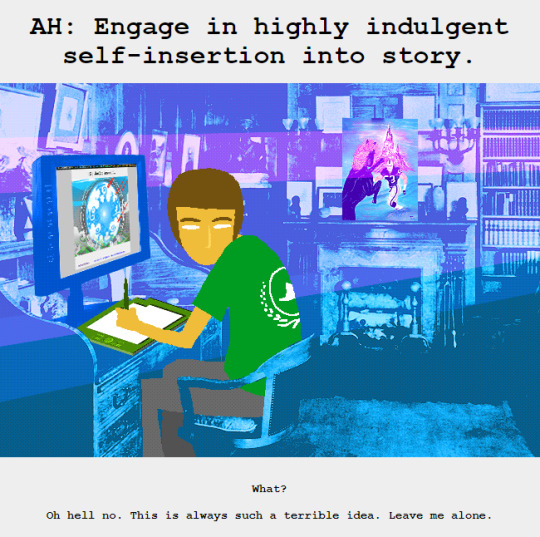
Yes, it is a terrible idea. This whole bit should've died right here.
Hussie proceeds to recap the entire first year of Homestuck which really is just a big waste of time to read. If you're really lost about what's going on, you should just read all my reread posts up to this point instead! Which... actually isn't ideal because I'm not really writing a comprehensive plot summary here. This series of posts is mostly aimed toward people who are already familiar with Homestuck and have read it before. If you tried showing these to someone who has never read the comic before, they'll likely be confused. Err, fuck it, let's move on!
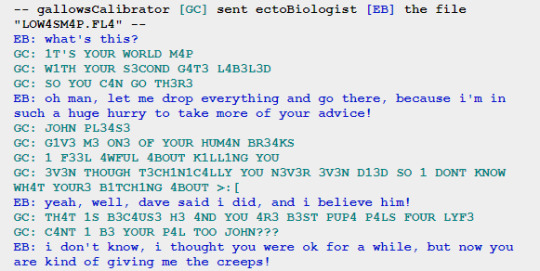
John is rightfully reluctant to listen to Terezi again. He typically shows resistance to commands only when they might put him in life-threatening danger. And since he finally decides to believe Dave's warnings, this counts as one of those situations.

I forgot to mention this in the last post, but Davesprite and Terezi's conversation was the first time "jegus" is used. Some people seem to think that this is the name of a troll analogue to Jesus, but really it's an in-joke between Dave and Terezi that gradually disseminates through their respective friend groups.

John's adversity shatters and he decides to start listening to Terezi again. It really didn't take much for her to convince him to do this. This is hardly portraying Terezi as some kind of "master manipulator." It's just another instance of John being a gullible moron.
Also, this will be the last conversation between John and Terezi until Act 6. Her conversations with the humans will be exclusively limited to Dave until that point. I guess she wasn't so serious about being John's "pal" after all.
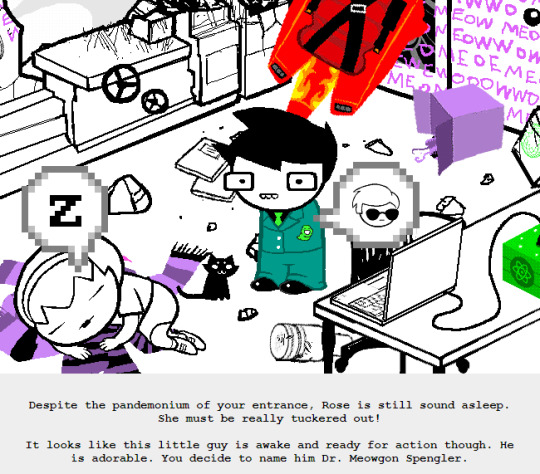
Bro what do you mean you decide to name him? That's Rose's cat. You can't go into someone's house and rename their pets.

I do like that Davesprite immediately points out how dumb it was that John decided to listen to Terezi again.

John is such a massive fucking cunt. He's really going to disrespect the guy who saved his life like that? Even apart from that, that's his best friend, or at least supposedly.
Davesprite's reaction is entirely justified here. He's supplying John with useful info, only to be met with disinterested responses and being told to fuck off in favor of the other Dave. I really think "ok" is John's catchphrase, even moreso than Aradia's. Pretty much every time someone tries to talk to him about the game is met with him going "oh ok" or "wow ok" like some kind of spongehead.
This conversation is notable because Dave's entire persona is centered on being detached, aloof, and "cool" but here Davesprite sounds genuinely pissed. He doesn't even care about maintaining the facade because his "best friend" just revealed he doesn't even see him as a person worth talking to.

Dave thinks he can speak on Davesprite's behalf, which he's definitely not qualified to do. He spent four months living in a pointless reality offshoot with the full knowledge that everything in it is a mistake that needs to be rectified. Rose, the one person he had for company in that timeline, had to be essentially killed in order to fix the timeline. And even if there's still a Rose that currently exists, that single version of Rose he spent all those months together with was still destroyed by his actions. Her blood is on his hands.
All this is to say he's definitely not the same person as current Dave. They may share the same memories and past experiences, but everything Davesprite experienced past the point of divergence is uniquely his. He's his own individual.

That "yeah" right before signing off cuts deep. He is sick of John's shit. Not that I imagine John would notice at all.
Davesprite might be the most tragic character in this godforsaken story. Having Rose's death weighing on his conscious, being forced to mutate himself into a ghostly half-bird monstrosity, letting another version of himself live out the rest of "his" life. He did it all for the sake of making sure his friends have a future to live in, but said friends don't respect him or even like talking to him. To them, he's an extraneous copy of their existing friend. He isn't "real."
And the sad thing is that it's not just his friends who think that. Hussie didn't give a shit about him either. Wouldn't it have been crazy if this conflict was explored and Davesprite was a bigger presence in the story? If he was actually acknowledged as part of the team and the other kids had to learn to stop treating him as "the other Dave"
Well too bad because for one thing, Hussie cannot write convincing conflict. If two characters don't like each other, they simply ignore each other and don't speak. So instead of Davesprite being a ever-present source of awkward tension within the group, he's downgraded to an impotent background character. Tough shit, Orange Dave.
Oh yeah, the less said about Davesprite's ultimate end, the better. What a fucking travesty.

Dave really wants John to snoop around Rose's belongings. The little freak. At least he stops short of asking John to rummage through her underwear drawer.
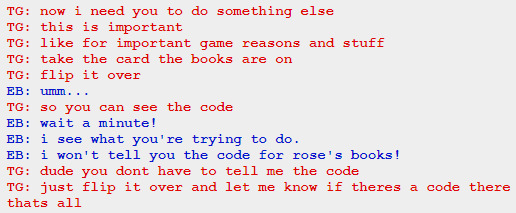
Technically one of the journals does contain "important game stuff" but Dave doesn't know that. I bet he just wants to know if she wrote about him in her journal.

Dave is putting more effort into invading Rose's privacy than just about anything else prior to this point. Obsessed much?

My god, that "come hither" expression. Things are about to get steamy on Derse.

"Whipping Bugwinged Fuckall" is an amazing Kanaya quote.
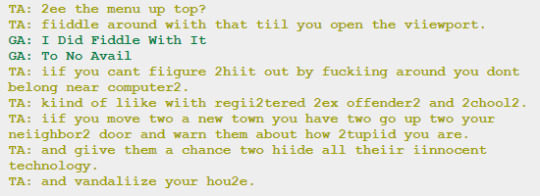
Oh look, Sollux's first appearance. He and Kanaya should've talked more. It almost feels like they're co-workers and he's the guy she bugs for IT support. It's a fun dynamic.
Also, I guess Alternia has sex offender registries, which makes no sense. I feel like you'd get straight up killed by the drones for much less.
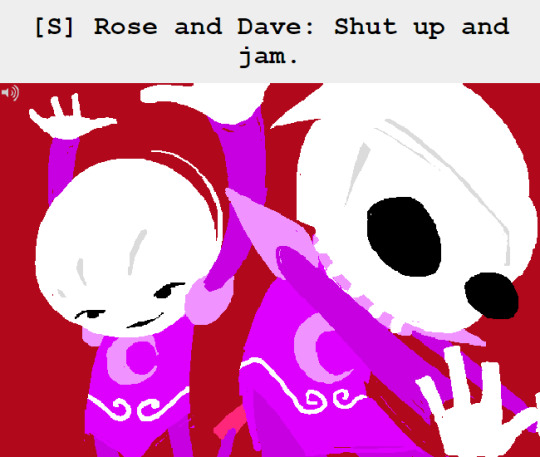
No I didn't leave this page open while the entirety of "Derse Dreamers" played. That would be silly. Also when I said things were gonna get "steamy" I obviously meant they'd get all sweaty from dancing. Jeez, what'd you think I meant? 😇

Cal is kicked out of the party for being a cockblock.

What are these "shenanigans" Davesprite engaged in to get the hammer from Hephaestus? Fuck if we'll ever find out.

Even though the two kingdoms are fated to fight each other and yadda yadda, there doesn't seem to be much enmity between them. WV is able to unify everyone with little effort.
[S] WV?: Rise Up is certainly a flash that exists. It serves as a follow-up to [S] Jack: Ascend, which I also wasn't really too enthused about. I didn't spend much time talking about it in the last post because I couldn't think of anything to comment about it. Which is strange, because you'd think the big flash to celebrate the comic's one year anniversary, as well as the one that introduces the story's main antagonist, would be a bigger spectacle.
But there's no action, no cool shots like in previous flashes, and ultimately Jack's "ascension" comes from the stupid bunny shit and not from any action on his part. The only real highlight of that flash is the killer tune that is "Black". Apart from that, it pales in comparison to previous flashes in the comic. Much of the same can be said about this one. At least "Skaian Skirmish" is a cool track.

When does this ever have a use? Just like with John, the only point of this whole alchemizing montage is to create a new outfit, computer, and weapon for Rose. The rest of these creations are useless junk.
I mention a new outfit, but the true irony is that the kids' best outfits (John's Vriska jacket, Rose's black dress, Dave's raglan shirt, and Jade's uhh... God Tier dress?) aren't even a part of these montages. For the first three, they're all acquired off-screen and we don't even know the recipes for them.
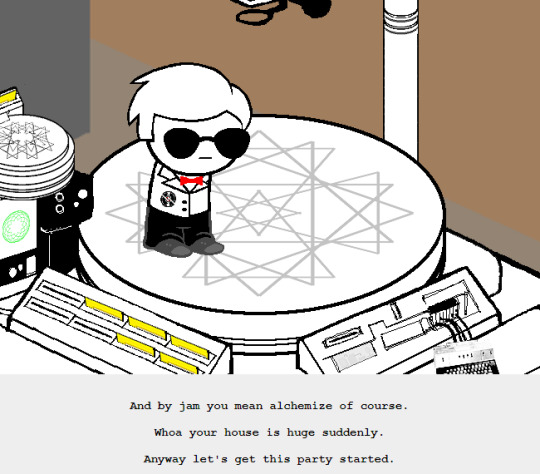
Trailing right behind Rose's montage, Dave gets his as well. Again, nothing of true value gets made here. These montages feel like Hussie padding out the page count. Seriously, who actually enjoys these parts of the comic?
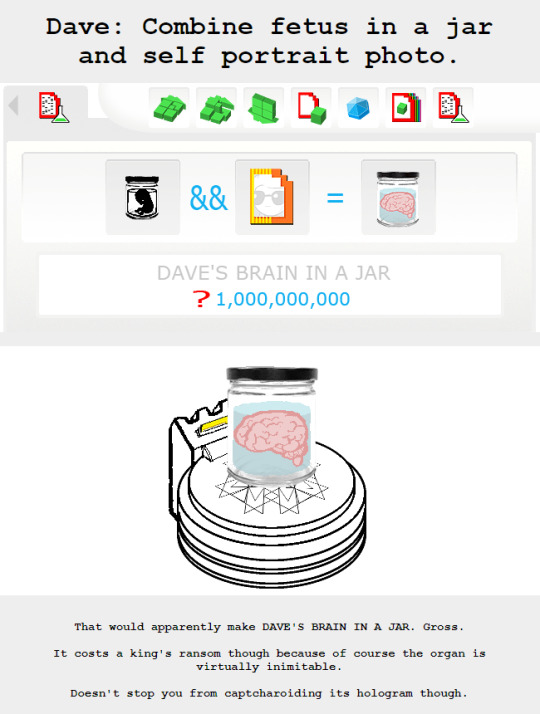
The alchemiter can potentially create body parts, albeit at an exorbitant cost. Could you imagine if this was actually implemented? If one of the characters lost a limb or something and they got an alchemized replacement?
They could've done that with Vriska or Tavros so they wouldn't have had to use robotic prosthetics. Man, that would've been cool.

I like how this is essentially a "secret" SBaHJ page because it isn't available alongside the others and only appears in Homestuck.
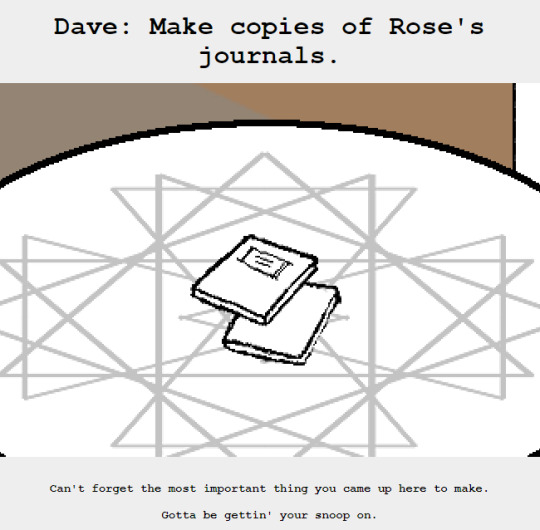
The "most important thing"? My gosh, he really wants to get in her business.
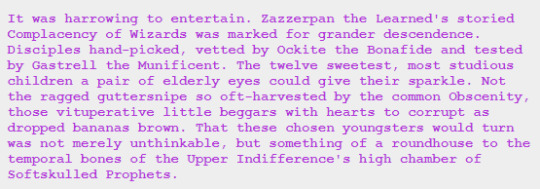
Yes, Rose's story is overly florid, verbose slop, but it feels so similar to Hussie's usual prose when he's trying to be descriptive that I'm not even sure if this story is written to be intentionally pompous or not.
Has Hussie ever tried submitting something for the Bulwer-Lytton Fiction Contest, the contest to write the worst possible opening paragraph for a novel? I'd bet he'd win without trying. (If you've never heard of this before, look it up and go to the website to read the winning entries. They're hilarious.)
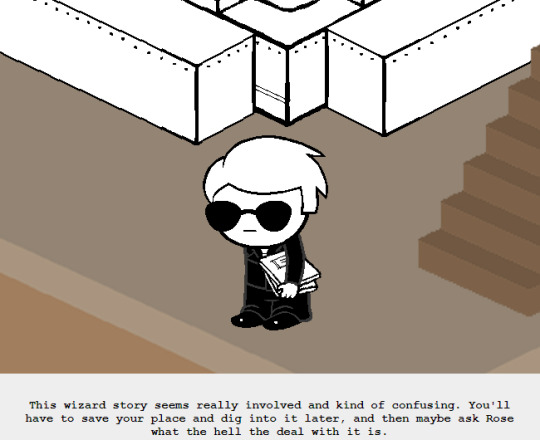
It is rather sweet that Dave likes the story enough to want to read more of it later, though.

Dave is able to figure out Mom Lalonde's intentions simply because he knows Rose well enough to tell when she's being dramatic. See, Dave doesn't even need to read Rose's journal to discover her true thoughts. He already sees through her well enough already (and she likewise sees through his act just as clearly).

The fact that Rose remembers "some things" about her previous self's existence sounds like something that should be investigated further, instead of being written off so abruptly.
Or is that "ok cool" a defense mechanism on Davesprite's part? Maybe talking to Rose is too painful for him, because she's not "his" Rose. Even if she retains all the memories from the future, she'll still never be the same Rose he left behind.
I really wish this was explored more. Davesprite and Rose never talk again after this conversation and it drives me insane. What if he actually tried pressing further about what she remembers about the timeline, trying to seek out remnants of "his" Rose? He could be trying in vain to reconnect with her, to apologize about leaving her to die, but all that ever happens is that he gets rebuffed.
And Rose might recall the moments she shared with another Dave in another timeline, but stamps them out as she continues to focus on the present and as she grows closer with Kanaya. Perhaps revisiting those memories of the doomed timeline, reliving the loneliness leading up to her demise, are too painful to recall. And Davesprite is a living reminder of them, so she pushes him away to make herself forget.
If only Hussie could write convincing and earnest tragedy. We were utterly robbed.
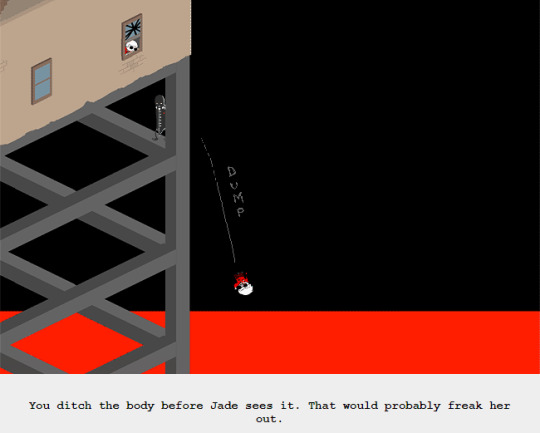
Dave makes it seem like Jade is the one who's going to freak out about the body. But somehow I doubt the girl who lives with the corpse of her grandfather, along with other taxidermied creatures, on permanent display is going to be fazed by another dead body. Yeah, I'm thinking Dave is the one who doesn't want to keep looking at his own corpse.
Also, I never noticed DD hanging out on the I-beam before. That's a neat detail.
This part of the Act is admittedly fun. Could it be because a lot of it had a healthy focus on Rose and Dave? It's amazing how much nicer the comic is to read when the focus is put on the stronger characters.
Unfortunately I already know that the next few upcoming pages are going to be one of my least favorite parts of the comic, so I'm not terribly looking forward to wrapping up this Act next week...
Read the next post here.
#homestuck#homestuck reread#john egbert#terezi pyrope#davesprite#dave strider#rose lalonde#daverose#kanaya maryam#sollux captor#wayward vagabond#jack noir
31 notes
·
View notes
Text
astro notes: daily transits 6/3
Monday, 6/3, Mercury's ingress into Gemini signifies a significant shift in the collective energy, as Mercury, the planet of communication, intellect, and travel, moves into one of its home signs. This transit emphasizes the qualities of curiosity, adaptability, and quick thinking, enhancing our ability to communicate, learn, and connect with others effectively.
Mercury in Gemini Mercury is the ruling planet of Gemini, which means it is particularly strong and influential when it transits this sign. Gemini, an air sign, is associated with communication, information exchange, and intellectual pursuits. It is characterized by versatility, social interaction, and a love for learning and exploring various ideas.
Key Themes of Mercury in Gemini
Enhanced Communication With Mercury in Gemini, the collective focus shifts to communication in all its forms. This period is marked by an increase in conversations, debates, and the sharing of ideas. People may feel more inclined to reach out, connect with others, and engage in social activities. Communication becomes faster, more fluid, and more dynamic, making it an excellent time for networking, negotiations, and collaborations.
Intellectual Curiosity Gemini is known for its insatiable curiosity and desire for knowledge. During this transit, there is a heightened interest in learning and exploring new topics. People may feel drawn to studying new subjects, reading, writing, and engaging in intellectual discussions. This is a favorable time for academic pursuits, attending workshops or lectures, and expanding one’s knowledge base.
Adaptability and Flexibility One of Gemini’s key strengths is its adaptability. With Mercury in Gemini, there is a greater capacity to adapt to changing circumstances and think on one’s feet. This transit encourages flexibility in thinking and problem-solving, allowing for innovative solutions and creative approaches to challenges. It is a time to embrace change and be open to new possibilities.
Multitasking and Versatility Mercury in Gemini enhances the ability to multitask and handle multiple projects simultaneously. This period is characterized by a fast-paced environment where quick thinking and versatility are advantageous. People may find themselves juggling various tasks and responsibilities, thriving in dynamic and stimulating settings.
Collective Implications
Increased Social Interaction The ingress of Mercury into Gemini is likely to boost social interactions and connectivity. People may feel more sociable and willing to engage with others, both in person and online. This is an excellent time for social gatherings, networking events, and community activities that foster connections and the exchange of ideas.
Flourishing Communication Technologies Given Gemini’s association with communication, this transit may see advancements and increased usage of communication technologies. There could be a surge in social media activity, the launch of new communication platforms, or improvements in existing technologies. Innovations that facilitate easier and faster communication are likely to thrive.
Spread of Information Mercury in Gemini supports the rapid spread of information. News, ideas, and trends can disseminate quickly during this period. It is important to stay informed and critically evaluate the information being consumed, as the speed of communication can sometimes lead to the spread of misinformation or superficial knowledge.
Emphasis on Education and Learning This transit places a strong emphasis on education and learning. Schools, universities, and educational programs may experience increased activity and interest. People are encouraged to pursue their intellectual passions, enroll in courses, and take advantage of opportunities for personal and professional development.
Working with This Energy To make the most of Mercury’s transit through Gemini, consider the following approaches:
Engage in Active Communication: Reach out to friends, family, colleagues, and new acquaintances. Engage in conversations, share your ideas, and be open to listening to others. This is a time to strengthen your social networks and build new connections.
Pursue Learning Opportunities: Take advantage of the heightened intellectual curiosity to explore new subjects and expand your knowledge. Enroll in courses, attend seminars, or engage in self-study to satisfy your thirst for learning.
Stay Adaptable and Flexible: Embrace change and be open to new experiences. Use this time to experiment with different approaches and solutions, and be willing to pivot as needed.
Utilize Technology: Leverage communication technologies to stay connected and informed. Explore new platforms, tools, and apps that can enhance your ability to communicate and share information.
Prioritize Multitasking Wisely: While the ability to multitask is enhanced, be mindful of spreading yourself too thin. Prioritize your tasks and manage your time effectively to avoid burnout.
follow for more astro insights like this and support me over on yt @quenysefields or instagram sensualnoiree
#astro observations#astrology#astro notes#astro community#astro#astro blog#astrology readings#astro placements#astroblr#astro posts#astrology fyp#astrology chart#astrology notes#astrology observations#sensualnoiree#astronotes#astrology signs#aries#taurus#gemini#cancer#leo#virgo#libra#scorpio#capricorn#aquarius#pisces
37 notes
·
View notes
Note
So with longterm chastity the cock is supposed to temporarily shrink when flaccid right, leading to smaller cages over time. With over 10yrs of being locked and only being unlocked for the Dr and for bike rides it's got to be safe to say that Tom must have shrunk a lot by now.
So what will happen when Tom has gone through all of the small cages, like the nub and nanos etc. Does he then start to wear the flat or inverted cages on a perma basis?
Bc we all know there should be no free room inside of them 😉.
"What you've just said is one of the most insanely idiotic things I have ever heard. At no point in your rambling, incoherent response were you even close to anything that could be considered a rational thought. Everyone in this room is now dumber for having listened to it. I award you no points, and may God have mercy on your soul.”
🔒Tom here. Back in the 90s when the internet was new, one of the things we early adopters were looking forward to was the ability to have widespread knowledge, leading to the increase in education. We believed that having all this information at ones fingertips would make everyone smarter.
Instead, we discovered that the most commonly disseminated materials are not information, but rather, disinformation, misinformation, wrong information, and simply bad information. So, don't take this personally, but pretty much every assumption that you made in your question was just plain wrong.
Being locked doesn't "shrink" your penis. It's not a muscle, and there's nothing there to atrophy. What happens is that the erectile tissue loses it's elasticity, and does not expand to it's previous size after some period of time. This also happens with age, especially with other health factors in play.
I don't measure myself because I'm not a teenager anymore. Has my erection gotten smaller? Yes, probably 10% or so. I don't get many opportunities to observe it, but that's kind of the point with us.
In my opinion, the nub and flat cages are not good for long term wear. Regular cages restrict erections; the tiny cages restrict and compress flaccid tissue. This means they need more frequent removal for cleaning, and there's always the potential for chafing and irritation.
There's no rule that says one's cage should not have any room. A rule of thumb suggests that a cage that is about the size of one's flaccid penis will prevent erections and be more comfortable, but that's about it.
However, I'm still wearing the same cage that I've had for the past six or so years (the A272), and do not have a need to go smaller. And as far as I can tell, all of my hydraulic and plumbing systems are functioning just as they should.

95 notes
·
View notes
Note
Does the idea of househusband gojo inetrest you? 👀👀👀 yes it does omg — imagine gojo as a househusband - he’d be such a simp for his partner like — oh the envy of every person who sees him picking up their kids… I love it #sab [asks] #sab [anons] #pls send me asks about this I’m obsessed
in an alternate universe, sukuna and kenjaku are defeated and satoru is alive.
satoru has lived his whole life being a sorcerer. he lived in a vacuum of a society – almost as though he was living in a parallel universe.
and so, in this universe, the ultimate result of the merger is the following: cursed energy gets absorbed and, as such, sorcerers are eradicated.
and so, you end up using this as a way of telling satoru that he needs a break, and, as a result, he ends up becoming a househusband.
why? because why not?
you may have a job you like.
say, as a result of jujutsu, you accumulated knowledge regarding curses/mythology/psychology in various forms of media ranging mosaics to cinema, and you decided to become a professor and teach on that topic? well, now you can, and you don't have to worry about jujutsu any longer! it's a thing of the past.
or, say, your true passion was business and finance? well, now you can! now, you get to live out your dreams of being a hot boss woman in a world full of finance bros.
or maybe your dream was to become an artist, and you never had the time to properly dedicate time for it, but, guess what, now you can! and perhaps you end up making works that reference the curses that you've seen or the experiences that you felt, and you may wish to translate them via oil paint or video art or even performance art, and somehow, perhaps because it's so familiar yet unfamiliar, your work gets popular and disseminated, and even awarded? who knows?
regardless, now, the world is your oyster! nothing is holding you back.
and you want satoru to take a break.
you gently encourage him, perhaps, by first suggesting that it's a temporary arrangement.
but regardless, even in this world of jujutsu that is of the past, satoru has accumulated so many years of work due to being a special grade sorcerer that he has accumulated years of exhaustion. and what ends up being a temporary arrangement of him getting rest for his efforts turns into a semi-permanent arrangement. perhaps.
and while you worked a lot, too, you didn't work in the same way that satoru did when he was a sorcerer. although, to some, it may look like satoru mucked about, he didn't. while juggling responsibilities as a teacher, he also had to tackle and cover a huge number of missions in the whole of Japan as well as abroad. that is one mission after another after another with little to no breaks. perhaps none at all. that is not to dismiss your efforts, of course, but to contextualise them.
meanwhile, you encourage him to try out the things that he might like – be it baseball or singing or something else entirely. or maybe get back into teaching? later?
and so, this marks a foray into the world of satoru the househusband – sorcerer extraordinaire of the past, and househusband extraordinaire of the present.
what comes later? who knows! cats? dogs? children? parrots? a house with a view by the sea? a trip to see giotto & his bottega's frescoes at assisi? or a trip to the andes mountains? a couples' retreat in phuket?
regardless, you take it easy and go with the flow.
and you encourage satoru to take it easy.
did you read my mind?? I literally was thinking this — set exactly after the end of jjk omg. I love this — and he would struggle so much, after being held to such expectations and being forced to work all the time — he wouldn’t know what to do with himself. He probably would even get depressed and anxious — and then eventually he would get used to it.
And oh my god if you had kids, he would be so excited to stay home and play and take care of them— he wouldn’t even want you to work since he’s rich, but if you wanted to, he wouldn’t be opposed
#sab [asks]#sab [anons]#sab [future fics]#apparently a househusband series#I really wanna get back to my sugar daddy! nanami fic on another note#I haven’t forgotten about that
42 notes
·
View notes
Text
The Philosophy of Truth Seeking
The philosophy of truth seeking involves the rigorous and systematic pursuit of truth and understanding across various domains of knowledge. It encompasses the methodologies, ethical considerations, and intellectual virtues necessary for discerning what is true from what is false. This philosophy is fundamental to disciplines such as epistemology, science, and ethics, and it plays a crucial role in how individuals and societies form beliefs, make decisions, and establish values.
At its core, truth seeking is driven by the belief that truth is valuable and worth pursuing for its own sake, as well as for its practical benefits. Philosophers have long debated the nature of truth, the methods by which it can be discovered, and the criteria for determining its validity. Some key aspects of the philosophy of truth seeking include:
Epistemology: The study of knowledge and justified belief. It explores the nature, scope, and limits of human knowledge, as well as the methods for acquiring and validating it.
Scientific Method: A systematic approach to inquiry that relies on observation, experimentation, and empirical evidence to develop and test hypotheses about the natural world.
Intellectual Virtues: Traits such as open-mindedness, intellectual humility, critical thinking, and perseverance that are essential for effective truth seeking.
Ethical Considerations: The moral responsibilities associated with seeking and disseminating truth, including honesty, integrity, and respect for evidence.
Truth seeking is not just an individual endeavor but also a collective one. It involves the collaborative efforts of communities of scholars, scientists, and thinkers who build upon each other's work, challenge each other's assumptions, and refine their methods over time. In this way, the philosophy of truth seeking underpins the progress of human knowledge and the advancement of society.
#philosophy#epistemology#knowledge#learning#education#chatgpt#metaphysics#ontology#Truth Seeking#Scientific Method#Intellectual Virtues#Ethics#Critical Thinking#Inquiry#Rationality#Evidence#Integrity#Open-Mindedness#Intellectual Humility#Collaboration
9 notes
·
View notes
Note
this is maybe a messy question but — is there anything you wish you knew before going for an academic career? i ask my profs too but most of them have had tenure for longer than i’ve been alive. (it’s the senior year career crisis! i adore my literature undergrad, but i realize the job market does not love me back.)
Okay, first things first, academic careers and circles depend on where you are, so—take this with a grain of salt. My situation might be very different from yours (the first obvious difference is that university is a state institution where I am, so it's public.)
So, you're right, and we all know this before we even go for it, the job market in humanities does NOT love you back, and neither does your institution: what we're doing can seldom be turned into something lucrative by private companies (if you even would want to work for them anyway), which means that funding is rare. In effect, it means that you don't really have work hours: you always wear different hats, with a lot of responsibilities in the university proper (teaching, preparing to teach, exams, administration, lab tasks, networking, lab projects, student supervision, academic jury positions, etc), other endeavours depending on your specialties (publishing work? translation work? paratext work? didactic experiments?), and then your personal research, which invades all the time you have left (reading, corpus work, writing, conference communications, publishing—in academic journals at least, you do not get money for your publication, and it's not always that you get funding to travel to conferences, either—in that case, you are literally paying to work).
All of these are indispensable, because the solidity and growing of your research, and thus your standing as an educator and a researcher, are judged by 1. your research not stagnating (don't spend 6 years giving the same seminar in different places); 2. your research being disseminated (publishing, communication); 3. your activities as an active member of this small, small world (administrative tasks; active participation in laboratory missions, events, projects; and later, advising and supervision of students and young researchers).
I don't think that's surprising to you, but it's worth thinking about. Deciding to go into academia feels like following a passion, and a passion project — at least it felt like that for me. But passion has only a very slim place in the day to day, and while it's good, important fuel, it won't be enough and it won't be fulfilled every day.
The one important thing that I hadn't really thought about before going into academia and that I find very important now is this, though: even if you are going into this for research, and learning, and writing, you will be an educator. Teaching will take a huge place in all of what you do. You and your knowledge don't exist in a personal bubble of self-nourishing: this is the privilege of a student. Whether you are teaching a class, writing an article, giving a conference, or talking about your specialisation to others, you are always teaching (while continuing to learn yourself, of course). I've met a lot of academics who behave as if being knowledgeable or expert affords them superiority, the right to belittle, the comfort to consider misunderstanding and difficulties as a failing from the student rather than a failing from their teaching—and all in all, the privilege to just come in, spew out what they know, and not care what is retained (in writing, by using obscure jargon, for example; in class... We've all had those teachers who don't give a fuck about whether you're getting it, and steam ahead with concepts they haven't bothered to bridge into what you're supposed to know). Those are the same people who say their students are "idiots" and get frustrated about the thankless chore of teaching when they could be doing something so much loftier with their time.
That's not it, though. Honestly, I don't even understand how you get there, because research teaches you quickly that you are ignorant and always will be; that there are no answers, only questions and perspectives. As an academic, your job is not just to dig into them further, but to make them graspable by others.
So. Being in academia is not a gateway into working in abstracts forever; it's a job, like any other jobs. It is a gateway into learning forever, if you make it that, but then again you don't need to be in academia to learn everyday. Most importantly, it comes with a duty of transmission that shouldn't be brushed aside, but rather should be part of your academic thinking: an epistemology of the subjects you teach, and the didactic shape you will give it.
There's a huge difference between knowledge and pedagogy, and going into academia for knowledge alone will only lead to disappointment. Excitement (for me at least) comes from the abstract, the work that you do alone, with the text, in that moment when you're not yet sure what's going to be sparked. But that's a minuscule part of it all; and it's the ethics of transmission, rather than the solitude of assimilation, that fill your day to day.
That being said, you can learn from transmission very much too, so it's not to say that it's bad.
ALRIGHT. This got super long, and I don't know if that really answers your question but... Here's my two cents about it!
55 notes
·
View notes
Text
Shout out to these MotherFuckers:
rory-maybankk is the leading bitch account tumblr
For starters, these fuckers are disgusting whores why? Because they have been cyberbullying, doxxing, sending death threats, and exposing private information. These people are the most disgusting people on fucking planet earth for bullying an 18 year old on twitter and tumblr which is absolutely disturbing and fucking gross. Funny how theyre all jiara shippers too, im fucking pissed off because they are exposing private information about my best friend and doxxing her and posting pictures of her and making her feel threatened and unsafe. Also heres a little information i read about doxxing in case yall wanna know if its fucking illegal
as you scroll down and read it is illegal to a certain point and how far you take it, lemme show examples
Doxxing is the act of revealing someone's personal information online without their permission. This information can include their real name, home address, workplace, phone number, and financial information. Doxxing can have serious consequences, including:
Harassment
Identity theft
Humiliation
Loss of job
Rejection from family and friends
Damage to reputation
Increased anxiety
Reduced confidence and self-esteem
IntentDoxxing can be illegal if it's intended to:
Threaten or harm someone
Intentionally cause emotional distress
Incite others to cause harm
Make someone fear for their safety
Now in this case its fucking illegal because these bitches are all ganging up on one person to fucking cyberbully and harass, i am beyond pisses about this and the person who is being bullied on here is filing a formal complaint to the police right now so anyone who is involved will be pressed charges if they don't stop now. This is beyond disgusting and evil and vile you all will for sure rot in hell for this. Funny thing how this even happened is because my friend doesnt like jiara and she doesnt like lilah pate, so they thought it would be a fun cruel game to harass the shit out of her and send death threats to her which is absolutely unexceptable. This is why the fandom of obx and jiara shippers are so fucking gross, disgusting and hated. because they like to take things wayyyy to fucking far and like to harass people till they get their way. I am absolutely disgusted by this behavior, and i know its wrong to wish bad things on people but i really hope all of the people that i listed on here go burn in fucking hell, they do not deserve to live for theyre disgusting actions and im so pissed off by their immaturity and actions. You all should be sent to prison for this shit and i hope karma bites you in the fucking ass and i hope it hurts the fucking hell.
more info about doxxing:
How much can you sue for doxxing?
A state bill would allow doxxing victims to sue those responsible in civil court for as much as $30,000, plus attorneys' fees and court costs. Supporters say it's needed to stem online harassment against LGBTQ residents and others.Jun 27, 2024
Those who "disseminate, disclose or transfer" the aforementioned data to third parties face a penalty of two to five prison years (one to three years of prison and fines of twelve to twenty-four months, if not directly involved in their discovery but "with knowledge of its illicit origin").
If you've been doxxed, you can contact your local police department if you feel your safety is at risk. You can also pursue legal action, such as sending a cease and desist letter or filing a legal complaint.
Doxxing is defined as publishing someone else's information online without their permission. It's important to note that publishing information that is already publicly available online or in public records is not doxxing.
Interstate Doxxing Prevention ActThis bill would make it a federal crime to publish someone's personal information with the intent to threaten, harass, or stalk them. The penalty for violating this bill could include up to five years in prison, a fine, or both.
Im tagging this to multiple outer banks tags because that whole drama is what caused this, simply because my friend does not like lilah pate and jiara. People have a fucking right to disagreewiht you or to not like the same things as you. Doxxing people is not ok im extremely pissed off at their immaturity and their actions and i hopr they see this, because i am also going to be filing a complaint to my police department about it too. You all deserve to go to hell and rot in prison, this is fucking disgusting.
Ziggy 🌼
#my posts🚌#jj maybank#rudy pankow#outer banks#jj outer banks#lilah pate#outerbanks#outer banks netflix#doxxing#cyberbullying#elaine siemek#jiara obx#jiara outer banks#jiara#jiara shippers are fucking disguting
6 notes
·
View notes
Text

Mark Heresy, American, b. 1965. Will to Power (detail), 1992, Ink on paper, 28 x 22 in, 2000.11.5, Gift of Peter Norton, Collection of the Haggerty Museum of Art, Marquette University
Putting on an exhibition was the furthest thing from my mind when, through my PhD assistantship, I was placed at Marquette University’s Haggerty Museum of Art in the Fall of 2022. To say that I was anxious to talk authoritatively about fine art would be a dramatic understatement. Historically, my visits to art museums included confusion about what was (and wasn’t) considered “good,” and my daily experience with art centered around the fan pieces I saw posted on Tumblr and Instagram. I was, to put it bluntly, terrified.
During the same time period, I was struggling to find the focus of my dissertation. With Master's degrees in both English and Business Administration, and with a passion for fanfiction, I knew I wanted to talk about fan compensation. I had read plenty of scholarly books and articles that were passionate about promoting fandom as valid, positive, and useful, and plenty more that broke down the unpaid labor that fans engaged in for their fan objects, but I had never seen these two concepts addressed at the same time. Texts considering fan compensation tended to view fan labor in a negative light. At best, fanworks were viewed as a gift from a fan to the fan community at large, with fans knowing they would be repaid when other fans within the community gifted their own fanworks in return. (Nevermind that I myself have a fic on AO3 that is—as of writing this—the only fic belonging to its extremely rare-pairing). At worst, fanwork was viewed as unpaid labor, utilized—often unethically—to prop up the mass-media corporations who profited from it. I wanted to consider the ways in which fans were paid that weren't specifically monetarily based, and I wanted to address the topic from a position of honoring and respecting fanworks in all their forms.
Even with this knowledge of what I wanted to discuss, I was struggling in my program. My experience in both of my Master’s programs had not prepared me for the fast pace at which new ideas and theories were disseminated in fan studies and through digital communities. Each time I thought I had found something new and exciting to add to the scholarship, I read a new paper—or more often watched a TikTok—which said my great idea in a better and smarter way than I had considered it. I felt discouraged and lost. I took a step back from my research, deciding to focus my time and energy on my assistantship instead. The museum was showing a portion of Marquette University’s collection of Tolkien manuscripts, and part of my duties included gathering three minute oral histories from fans for The J.R.R. Tolkien Fandom Oral History Collection. Inspired by this experience, I began to think about museums and archives, about what gets archived, about what gets displayed, and about who gets to make those decisions.
When the Haggerty Museum’s Curator for Academic Engagement approached me about an exhibition centering my own research, my first thought was to hang fan art on the walls. This, I was quickly told, was not an option for a plethora of reasons. Couldn’t I instead, it was suggested, use fine art pieces to discuss these types of fanworks? I first considered using pieces that could themselves be seen as fanworks—variations on mythology and biblical stories, new ways of considering historical moments and places, Andy Warhol’s Marilyn Monroe… but this didn’t feel like enough. Everything is inspired by something. Is that enough to make it a fanwork?
It was from these thoughts and musings that Affirmation/Transformation: Fandom Created was born. Fourteen fine art pieces were selected from the Haggerty’s permanent collection—each of which will be used to discuss something that fans create. I categorized fan creations broadly: alternative readings, collections, community and collaboration, emotional responses, histories, identity, meanings, new texts, parasocial relationships, play, political and social movements, rivalry and opposition, rules, and theories.. The 14 fine art pieces will be hung in the gallery during the exhibition, but are also currently available to view online. In this ongoing project, fans are invited to create fanworks inspired by these 14 pieces, and the fanworks submitted will be displayed digitally alongside the fine art. Think of it like a Prompt Meme challenge, featuring fine art as your prompt!
My experience with fandom is as much about community as it is about the thing I’m a fan of, and this is why it was so important to me to avoid discussing fandom in a vacuum. An exhibition of just my voice explaining what fans created felt cold; it felt disconnected from and disrespectful to the very thing I was trying to celebrate. This is why my dissertation project is collaborative, featuring the voices and creations of fans everywhere. I also feel called to ensure that these fanworks are treated with the respect that they deserve. This doesn’t just apply to the ways in which I will write about them in my final dissertation text; moreso, it is vitally important to me to take advantage of the opportunity I have to archive fanworks in Marquette’s institutional repository. Archiving these fanworks not only preserves them for potential future academic research, but also marks them—and fanworks in general—as being worthy of a place within the academic archive. Fan submissions for Affirmation/Transformation: Fandom Created are being accepted now, and will continue to be accepted through the close of the exhibition (December 22, 2024). In order to be on display in the gallery on opening night (August 23, 2024), fanworks must be submitted by August 1st. All types of fanworks are welcome, as long as they are submitted digitally. Sound will be available to be played in the gallery (fanworks will be displayed on tablets with headphones attached). For more information, visit https://epublications.marquette.edu/fandom/Affirmationtransformation/, or email Kate Rose at [email protected]
#author: kate rose#affirmative fandom#fanhackers#transformative fandom#haggerty museum of art#mark heresy
18 notes
·
View notes
Text
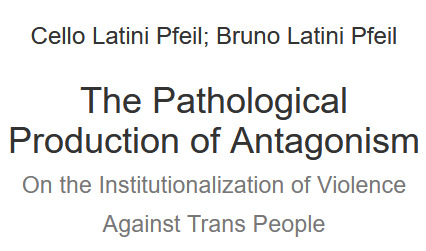
The institutionalized invention of transsexuality
For quite some time there has been a tendency in the Social Sciences to be driven by knowledge that does not accept alternative, popular and dissident concepts as legitimate; a tendency that aims to keep hegemonic knowledge in its place of hegemony and “subaltern” knowledge in “its place” of subalternity. It is a monoculture of knowledge (SANTOS, 2014), in the sense that the cultivation of certain beliefs and ideologies nullifies the possibility of other ways of thinking being validated. The monoculture of knowledge produces epistemicide, “the murder of knowledge” (SANTOS, 2014, p. 149). The academically legitimized studies on transsexuality are based on the same premise: the monoculture of knowledge, which offers certain [cisgender] figures institutional protection so that they can determine what it means to be trans.
In relation to transsexuality, its emergence as a sociological category occurred as a pathology, a disorder that could be diagnosed. The pathologization of trans individuals takes place through the eyes of cisgender physicians, holders of epistemic privilege (GROSFOGUEL, 2016), never considering the self-determination of the individuals referred to as “patients”. The antagonism of epistemic privilege is epistemic inferiority, epistemic racism/sexism. Grosfoguel (2016, p. 30) defines epistemic racism/sexism as “the inferiority of all knowledge coming from human beings classified as non-western, non-male or non-heterosexual”, and to this we add non-cisgender, dissenters from the cis and heterosexual norm. The “transsexual” category was formulated within North American and European universities, by the hands of “intellectuals” and whose scientific production did not encounter any barriers to being disseminated, as it was already embedded in the institutional apparatus responsible for legitimizing it as scientific. This invention was responsible not only for the current way in which physicians approach transsexuality, but furthermore for the way in which other institutions — legal, educational, academic etc. — exclude, historically erase and violate trans people. Therefore, in order to better understand this process and its consequences, a brief historical review of the institutionalized invention of transsexuality is in order.
Reiterating Grosfoguel’s assertion that the predominant knowledge in our global system, in our schools, universities, hospitals and clinics, derives from five countries — France, Germany, England, the United States and Italy -, the hegemonic understanding of transsexuality comes especially from the United States and Europe. The first mentions of “transsexuality” date back to the beginning of the 20th century: in 1919, the term “transsexualism” was used by the german physician Magnus Hirschfeld; in 1949, the american sexologist David O. Cauldwell used it again in the paper Psychopatia Transexuallis, in which he analyzed the life of a transfeminine person. But the earliest medical records concerning transsexuality — and which underpinned the way gender is currently diagnosed — emerged in the 1950s in the United States, based on the studies of endocrinologist Harry Benjamin (BENTO & PELÚCIO, 2012), one of the forerunners in the establishment of a cisgendered trans subjectivity. According to this logic, the only possible ‘treatment’ for ‘real transsexuals’ would be transgenital surgery. No therapy could reverse the transsexuality of a ‘true transsexual’.
In contrast to Benjamin, the north-american psychiatrist Robert Stoller, professor at the University of California, refuted the practice of surgery or any procedures that could be considered ‘social transitions’. For him, trans people should be convinced that in fact they needed psychiatric treatment (BENTO & PELÚCIO, 2012). Another important personality was the north-american physician John Money, from Johns Hopkins Hospital. For him, children would already have their sexual identity defined by the age of 3, which encouraged him to advocate transgender surgeries. In 1966, the Johns Hopkins Hospital opened the Gender Identity Clinic, one of the first to cater for transgender people.
Throughout the 1960s and 1970s, Benjamin’s efforts influenced the performance of surgical procedures relating to the medical veracity of transsexuality. In 1973, John Money coined the term ‘gender dysphoria’ to designate a symptom determining transsexuality and, in 1977, the Harry Benjamin International Gender Dysphoria Association was founded, an institution responsible for publishing and updating the Standards of Care (SOC) and legitimized as a world reference for the care of trans people (BENTO, 2006). Along with the SOC, the International Code of Diseases (ICD) and the Diagnostic and Statistical Manual of Mental Disorders (DSM) constitute the main documents that pathologize transsexuality.
In 1980, transsexuality was included in the ICD. During this period, Leslie Lothstein, a professor at Yale University, contributed to structuring the diagnosis of transsexuality by carrying out a study with ten adult trans people. In 1994, the DSM-IV replaced the diagnosis of ‘Transsexualism’ with ‘Gender Identity Disorder’, breaking down the diagnoses by age and creating yet another category, ‘Gender Identity Disorder Not Otherwise Specified’, aimed at people who did not meet the requirements of the previous diagnoses.
There are constitutive differences regarding ‘trans identity’ in the three documents — SOC, ICD and DSM — and with each new edition the diagnostic definitions are reviewed. For example, the DSM-IV focuses on identifying the traits of the ‘disorder’ in childhood, briefly addressing the issue of surgery. In its fourth version, gender, sexuality and sex are used arbitrarily in the qualifications of the ‘disorder’. Sex and gender would be synonymous. In the tenth version of the ICD, transsexuality was included in the section entitled “Personality Disorders of Sexual Identity”, characterized by the “desire to live and be accepted as a person of the opposite sex”, and this ‘sexual identity’ could only be validated if the patient had presented it for at least two years. Although these concepts have been updated over the years and have differed from one another, SOC, DSM and ICD perpetuate the same pathologizing perspective in the academic and medical fields.
The ICD-11 no longer conceives of transsexuality as a “gender identity disorder”, as the ICD-10 had previously proposed, and places it in the “conditions related to sexual health”, as “a marked and persistent incongruence and persistent incongruence between the gender experienced by the individual and their assigned sex”. The DSM-V, in turn, defines gender dysphoria as a “marked incongruence between a person’s experienced/expressed gender and their assigned gender, lasting for at least six months”, and argues that the best diagnostic method is the observation of child behavior, the child’s preference for ‘boy’ or ‘girl’ toys, the desire of ‘boys’ to wear ‘feminine clothing’ and ‘girls’ to wear ‘masculine clothing’. It does not fail to mention the importance of identifying, as a diagnostic trait, a “strong dislike of one’s own sexual anatomy”.
The influence of Stoller on the DSM, with its psychoanalytic discourse, and that of Benjamin on the SOC, with its endocrinological and physiological roots, can be found. As endocrinology seeks to discover the biological origins of transsexuality and is responsible for delivering the final decision on transgenital surgery, the psychological sciences (psychology, psychiatry and psychoanalysis) attempt to understand one’s desire to undergo the surgical procedure, as the demand for surgical interventions is perceived as an essential requirement for a ‘true transsexual’. The commonly asked questions by physicians, psychiatrists, psychologists and psychoanalysts take the trans person’s word almost as a lie: do you really want to do this? Are you sure you want to make such drastic changes? Will you not regret it? For someone to be ‘truly’ trans, they would have to prove that they are not compulsively lying. The decision is never made by the trans patient, but by the holders of epistemic privilege, of the power to legitimize or delegitimize the patient’s narrative. Despite the theoretical differences, both fields — endocrinology and psychiatry/psychoanalysis/psychology — fear the same situation: being deceived by ‘lying transsexuals’. Health services for trans people in Brazil, for instance, promote ‘gender asepsis’, a categorization of trans people into those who are ‘truly trans’ and those who are ‘untruthfully trans’ (BENTO, 2006).
The most significant feature of the aforementioned documents lies not in their differences, but in their similarities. Whether from the perspective of Benjamin or Stoller, Bento & Pelúcio understand that the elaboration of the concept of transsexuality by medicine occurred in such a way that trans people were “conceived as having a set of common indicators that position them as disordered, regardless of historical, cultural, social and economic variables” (BENTO & PELÚCIO, 2012, p. 572). The ‘truth’ of transsexuality is to be found in discourses about rejecting one’s own body, in dysphoric suffering, in necessarily conflicting family relationships, in a traumatic childhood. Any life experience that doesn’t fit in with these dictates immediately casts doubt on the legitimacy of the person’s own transsexuality and prevents them from accessing the health services they need. After reviewing the various pathologizing documents and movements regarding transsexuality, Bento (2011, p. 96) reveals her surprise at realizing that “so little so-called scientific knowledge has generated so much power”.
The common assertion of axiological neutrality, which psychiatry uses to justify its diagnoses, aims to annul its social position, to neutralize the perspective of the subject who produces knowledge, as if it were possible to assume a position of total neutrality. Neutrality becomes a farce when we consider precisely which beings hold and have held the places where knowledge is produced and which have never been able to enter a university as students or professors. Not only does it apply to a gender perspective, but also to race and class. The holders of epistemic privilege, who devised the diagnostic category of “transsexuality”, relied on a cisheteronormative perspective to list, name, categorize, subordinate and humiliate the trans people who came to them in search of assistance, but who found — and still find — an environment of control, tutelage and humiliation: if one wishes to access health devices, from routine care to surgical procedures, one must be evaluated according to the symptoms set out in the ICD, DSM or SOC. These documents, drawn up by North American and European institutions, are considered valid regardless of where they are operated on. A cisnormative and eurocentric scientific paradigm is imposed, one that does not dialogue with the self-determination of trans subjectivities or with gender identities from non-Westernized cultures — which, by the standards of this science, are furthermore considered pathologies.
The pathologization of trans identities is far from granting access to health institutions, on the contrary. Jaqueline Gomes de Jesus (2016, p. 198) perceives a generalization of the medical care given to trans people by health professionals, who end up “disregarding their particularities, or considering, ubiquitously, that all their health demands are restricted to the process”. Only if we replicate medical discourses about what it means to be trans, if we report suffering from dysphoria since childhood, and express our anguish over being born in the ‘wrong body’, are we legitimized as ‘real’ trans people, and especially if we urgently expose our repulsion towards our genitals and the need to have transgenital surgery.
As trans people’s autonomy over their own identities is scrutinized; as bureaucracies are created so that we can access trans clinics, hormonization processes and surgeries, the situation for intersex people is, in a way, the opposite. Surgeries on their bodies are encouraged, even if against their will. Investigating the records from 1990 to 2003 of a brazilian pediatric surgery clinic for intersex children, Machado (2005, p. 62) noted the repetition of “expressions such as “genitalia with a good aesthetic or cosmetic aspect””. The doctor’s “gaze” would be decisive in judging the “good aspect” of a genitalia, which would decide whether the child should undergo genital modification surgery, according to the sex assigned to them by the medical team. Heteronorm is present even in the details of surgical procedures.
This contradiction between how trans and intersex people are treated in medicine conveys a message: what matters to the “health” institution is not really the well-being of those people, but the reproduction of a norm that must be kept operative. Why are trans people systematically denied hormone therapies, surgeries, cosmetic procedures, civil registration changes, access to public restrooms, schools and spaces of empowerment? For what ends there are, for intersex people, pediatric surgery clinics — that is, surgeries on children — that encourage physical genital changes in infants, without them even being able to decide for themselves about their own identity? Why are physicians responsible for determining the sex of the child, and why are the surgeries performed with a heterosexual and cisgender bias?
Trans people are constantly put to the test. Our behavior, the way we speak and the way we dress are analyzed and questioned: in the case of a transmasculine person, for example, sitting cross-legged can lead to doubts on the part of the medical team: “Are you really trans? If you wanted to be a man, you’d act like a man”. These conflicts are referred to by Bento as an ‘invisible protocol’, present in the strange looks from the medical team, the insults, the whispers and all the attitudes that remind the trans person of their deviant place. The relationship between the medical team and the patients continues through the “essentialization of relations of power [...] by which the medical know-how doesn’t leave alternatives to the patients” (BENTO, 2006, p. 61).
This essentialization is not limited to relations of power, but extends to the standardization of a trans identity through the correlation of certain symptoms, in order to diagnose gender dysphoria, gender identity disorder, gender nonconformity or any other term that points to one’s incompatibility with cisgender norms. As anarchism includes in its fundamentals the defense of self-determination, then the control regime over trans people, erected by pathologization, is contrary to any and all principle that follows the anarchist logic of emancipation, because in pathologization there is no possibility of self-determination. By annulling the self-determination of trans people, the colonialist and institutional way of annihilating non-normative cultures and subjectivities is reproduced. Decolonial and anarchist ideas take a stand against this process.
If the legitimization of our identities by government institutions depends on the deepest submission to cisgender normativities, from the detailed elaboration of our narratives to the affirmation of our desires, then, in this and other contexts, the State constitutes itself as the ultimate denial of the freedom of its governed. This denial worsens as the individual distances themself from the colonial epistemological standard. For this reason, from an anarchist perspective, we defend the impossibility of any State to perform a favorable role for trans people, as well as for black, indigenous and insubmissive beings. Anarchist political theory is not static; it undergoes changes and adaptations according to the context in which it is inserted (WOODCOCK, 1998), but anarchist principles should not be abandoned, as they advocate the need for constant change.
In its transformations, anarchist philosophy consistently rejects any kind of authority, which means, politically, denying any form of government and, economically, denying any form of exploitation; and we can infer, in a medical sense and, more broadly, in any institutional sense, the denial of any authority figure that has the power to control a body, to impose rules upon it, to subject it to humiliation and behavioral protocols, to regulate its desire and its identity.
Thinking of “transsexuality” as a category created in a place of power, immersed in the concept — still not widely accepted by cisgender academics — of cisnormativity, we can see how, from Harry Benjamin’s studies to the present day, the defense of self-determination is something poignant among trans movements and remains necessary in the defense of every marginalized group. In general terms, even if we say we are trans and elaborate a narrative of self-hate, of ‘I was born in the wrong body’, the truth about who we are will be in the hands of a medical authority. Even if we remain in a transsexualization program for two years, with psychiatric and endocrinological monitoring, the medical team’s opinion may be negative. In other words, they may decide that we are not trans and that we cannot undergo physical modifications in relation to gender self-affirmation. The truth of gender and sex is in institutionalized hands.
#queer#queer theory#cisheteropatriarchy#tranarchism#transgender#transgender liberation#cisnormativity#decoloniality#decolonization#institutional violence#transsexuality#anarchism#anarchy#anarchist society#practical anarchy#practical anarchism#resistance#autonomy#revolution#communism#anti capitalist#anti capitalism#late stage capitalism#daily posts#libraries#leftism#social issues#anarchy works#anarchist library#survival
9 notes
·
View notes
Note
Will you let us know how it goes tomorrow???
Hello friend!
Interview done – much tougher than I anticipated, but I did well.
They really dug into the substance of my application, and asked me about queer history, social network analysis (from my PhD work), knowledge dissemination in the 18th century, and other things about method and content... So much for "tell me about yourself"! I snuck in a brag about my many languages and the citizen history projects I've done, both of which got very positive responses.
I'll hear back in about two weeks. I'm happy with how I did, so it's ultimately a matter of seeing if I did better than at least half the other applicants.
#always hard to assess one's own performance#but i didn't have any noticeable stumbles#and got a few “that's a great answer” comments#all in all it was a good conversation with a nice back and forth flow#and i think i dropped enough very specific details to prove i'm not just messing around (samuel johnson's dictionary my beloved)
13 notes
·
View notes